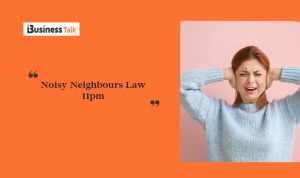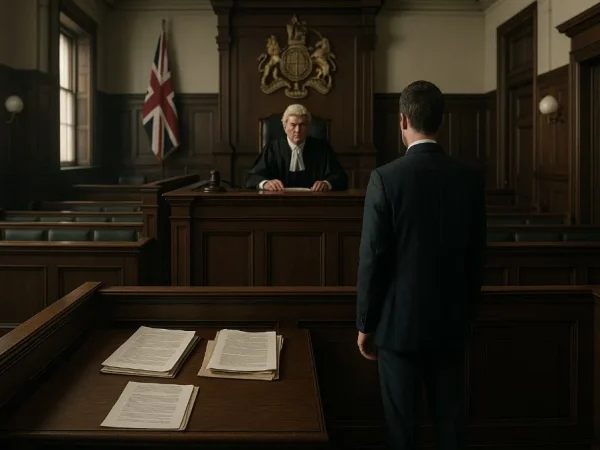
Noisy Neighbours Law 11pm – Noise Nuisance and Neighbours
One of the most annoying things about living in a shared space is dealing with the noise from your neighbours. And while it’s not possible to control what your neighbours do in their homes, there are laws in place that can protect you from excessive noise pollution. Did you know that there’s a Noisy Neighbours Law 11pm that can help? Specifically, between 11 pm and 7 am, noise that is loud enough to disturb someone is illegal.
In this blog, we’ll look closer at the law, what is a noise nuisance, and how to resolve noise problems. We’ll also go over what constitutes a statutory nuisance, the steps you can take to invoke noise reduction, and how planning applications deal with noise. Finally, we’ll explore commercial noise, noise from loudspeakers, and complaints about dogs barking. So if you’re disturbed by your neighbour’s noise, read on for your legal options.
Noisy Neighbours Law 11pm

The Noisy Neighbours Law specifically targets people who make excessive noise during what is known as ‘unacceptable hours’. This period falls between 11 pm and 7 am. If your neighbour is disturbing your peace and making excessive noise during this period, action can be taken against them. The law requires that the person responsible for the noise take action to reduce it to an acceptable level.
Failing to comply with the Noisy Neighbours Law may lead to a fine. Excessive noise can lead to several consequences, ranging from stress and anxiety to sleepless nights and damaged relationships. If you live in a noisy neighbourhood, you must discuss your concerns with your neighbours and resolve the issue peacefully.
Night Hours
The Noisy Neighbours Law dictates that it is illegal to make excessive noise that can harm your neighbours, particularly between 11 pm and 7 am. This law applies to residential and commercial areas, and failure to comply can result in fines or property seizure.
It’s important to be aware of the noise restrictions in your neighbourhood and to avoid causing any unnecessary disturbance that could lead to complaints from neighbours. By being responsible and respectful of others, it’s possible to maintain a peaceful and harmonious community that benefits everyone.
Resolving Problems With Noise

Dealing with noisy neighbours can be a frustrating and stressful situation. If you’re experiencing noise nuisance from your neighbours, there are several steps you can take to resolve the issue. The first step is speaking to your neighbour about the problem and working together on a solution.
If that doesn’t work, you may consider mediation or arbitration. These processes allow a neutral third party to help you and your neighbours resolve. However, legal action may be necessary if mediation or arbitration is unsuccessful.
Several laws, including the Noise Nuisance and Neighbours Law, could apply to your situation. Understanding these laws can help you get the best outcome for your situation. For example, the law stipulates that noise should be minimal after 11 pm.
Statutory Nuisance
The Noisy Neighbours Law, specifically the 11 pm rule, is in place to address the issue of noise nuisance and its impact on neighbours. Statutory nuisance is a legal term that refers to an action or behaviour so loud, persistent, or damaged that it qualifies as a nuisance.
If you are experiencing statutory nuisance due to noisy neighbours, you have the right to file a complaint with the relevant municipality. The municipality will then investigate the matter and take appropriate action, such as issuing a warning or ordering the offending party to stop their behaviour.
While statutory nuisance is not criminal, it can lead to civil litigation if not addressed. Therefore, it’s important to know your rights and take action to protect yourself from the negative effects of noise nuisance.
Noise Abatement
If you’re not experiencing statutory nuisance but still want to reduce the noise level at your rental property, a few options are available to you. For example, you can install soundproofing materials or any improvement ideas in your home, hire an acoustic consultant to come and assess the situation or use noise-cancelling technology.
District councils may declare all or part of a district an alarm notification area, which you may also do under the Clean Neighbourhoods and Environment Act. This holds true for both inhabited and unoccupied residential and business premises.
Noise and Planning Applications

When making noise-related planning applications, you should remember the 11 pm rule and other statutory provisions that may apply. For example, suppose your proposed activity would create a noise level that exceeds the allowed level by 50 decibels (dB). In that case, you must submit an environmental assessment report (EA) to show how the noise levels will be controlled.
Commercial Noise
A bar or club must get an entertainment permit to host musical performances. You can notify the district council if loud music or disturbances at bars and clubs upset you. The council may take enforcement action against a venue for violating its entertainment licence if it gives a warning concerning noise that the venue disregards.
The council has three options,
- Punish the establishment
- Bring legal action against it
- Revoke its entertainment permit
Noise From Loudspeakers
Noisy neighbours can be a major source of frustration for many people, but laws are in place to help mitigate the problem. For example, the Noise from Loudspeakers Act 1995 makes it illegal to use loudspeakers (except for religious purposes) between 11 pm and 7 am. This law is designed to reduce the noise nuisance caused by loud music or other entertainment activities that can disturb neighbours during their rest hours.
While noisy neighbours can be a major issue, it is important to remember that legal options are available for those affected by loud noise. If you are dealing with noisy neighbours, it may be worth consulting with a legal professional to see what steps you can take to protect your peace.
Complaints About Dogs Barking

This law addresses common noise nuisances, including excessive barking from dogs. Residents who believe their neighbour is violating this law can file a complaint. Complaints about dogs barking can often be resolved through communication and negotiation with the neighbour.
Residents can file a formal complaint with the local municipality if this approach is unsuccessful or the issue persists. It’s important to note that the purpose of the law isn’t to eliminate noise but to ensure it’s kept at a reasonable level during certain designated hours.
Legal Action About Noise
Legal action can be taken against people who break this law, with potential fines or jail time as penalties. However, you must know your legal responsibilities regarding noise nuisance and neighbours to avoid legal consequences. Therefore, consider the impact of your noise on your neighbours and take action to minimize it, especially during the restricted hours governed by the Noisy Neighbours Law at 11 pm.
Conclusion
Living near noisy neighbours can be extremely distressing, disturbing your peace all day and night. But thankfully, there are laws in place to control noise pollution and protect your right to live in reasonable peace.
If you are experiencing noise nuisance and struggling to resolve the problem with your neighbours, it’s important to know your rights and the steps you can take to tackle the issue. From addressing the problem with your neighbour directly to taking legal action, you can regain control of the situation in various ways.
FAQ – Noisy Neighbours Law 11pm

Is it illegal to make noise after 11pm UK?
Yes, creating excessive noise after 11 pm is generally illegal in the UK. The Noise Act 1996 confers local authorities to take action against those creating a noise nuisance between 11 pm and 7 am.
Some exceptions exist for certain activities, such as emergency work and noise from licensed premises. If you’re disturbed by noisy neighbours, you can first speak to them and ask them to reduce the noise. If the issue persists, consider reporting it to your local council.
How do I deal with noisy Neighbours at night?
Dealing with noisy neighbours at night can be frustrating. To address this issue, it’s best to approach your neighbours and resolve the matter amicably.
If this does not work, consider investing in noise-cancelling headphones or earplugs to reduce the noise. If the noise disturbance persists, you can file a complaint with your local authority.
Keeping a record of the noise disturbance, including dates, times, and specific instances, can help support your complaint and increase the chances of it being resolved.
Can you play loud music before 11pm?
Whether or not you can play loud music before 11 pm depends on your area’s local noise ordinance laws. Generally, noise levels are expected to be lower during late-night hours to avoid disturbing neighbours.
Some areas may have specific times or permits for louder music. Nonetheless, it is always recommended to be considerate of your neighbours and keep noise levels to a minimum during late-night hours.
Who do I complain about noisy Neighbours?
If you have noisy neighbours, it is best to first speak with them directly about the issue. If this does not resolve the problem, consider contacting local authorities, such as the police or the council.
When making a complaint, be sure to provide specific details about the noise, including the time, duration, type of noise, and impact on your daily life. Keeping a noise log, including dates, times, and descriptions, can help resolve the issue.
How do I ask my Neighbour to turn music down?
If your neighbour’s loud music is bothering you, it’s best to approach them in a friendly and polite manner. Express your concerns and how the noise affects you, and kindly ask if they could please turn down the music or consider using headphones instead.
If the issue persists, speaking with a local authority or seeking mediation services may help find a resolution that works for both parties. Remember to remain respectful and calm throughout the process.





